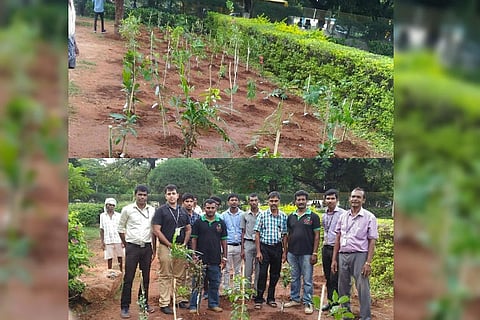

It was in 2018, during their final year of engineering in Pollachi, that Ramachandran (21) and Karvendhan (23) were introduced to Akira Miyawaki. The 91-year-old Japanese botanist is known for pioneering the Miyawaki forest method that involves growing self-sustaining mini forests in urban areas. This concept sparked a business idea for the two students and eight months later, they launched EasyForest – a start-up that aims to transform Tamil Nadu's urban landscape.
At the outset, Ramachandran clarifies that the initiative is very much for-profit.
"We have different types of services. We don't charge educational institutions such as schools and colleges. But for corporates, offices and industrial campuses, we do take a small fee," he says.
The duo, along with their team of volunteers, offers an alternative to lawns and barren lands within campuses, by turning them into fast-growing mini forests. Apart from growing forests from scratch, EasyForest provides a host of technical expertise and knowledge on the soil, vegetation and maintenance of the green space."If you think about it, lawns provide no functional purpose. So we urge people to convert these areas into mini-forests which become the much-needed green lung," Ramachandran adds.
DIY mini-forests
For academic institutions that already have the manpower and resources, the company provides the layout and transfers the technical knowledge.
"We get them to source the saplings, the tools and mulching material to fertilise the soil. Since it’s mostly consulting and the project is for educational purposes, we don't charge them any fee. The students from these schools or colleges who are interested then volunteer to grow the forests," Ramachandran says.
For corporates and industrial spaces, the company visits the sites, conducts soil tests, consults local farmers on the ideal vegetation and native species that grow here and then proceed to grow the forests for them for a nominal fee.
"If we provide the entire service, from soil analysis to the growing of the forest, then it comes up to Rs 145 per square feet. If it is just consulting, then it depends on many factors but we charge around Rs 30-40 per square feet. For acedemic institution which requires the whole service, we offer it to them for zero profit," he says.
How to grow mini-forests
EasyForest is inspired by the Miyawaki method. However, the founders have added a twist to the plantation after consulting experts.
"We always grow native varieties of trees. And unlike Miyawaki, we grow hundreds of varieties of species within a tiny space. This way, nutrients are taken from several levels of the soil," he adds.
As per their EasyForest method, there are 5 layers of planting. Layer 1 comprises big, canopy trees which take up space, like banyan, neem, peepal and others. The second layer is comprised of trees that grow vertically, such as papaya, palm trees and others. The third layer is made up of the sub-trees, in which smaller species such as lemon, orange etc are planted. Flowering plants such as Rose, Jasmine, hibiscus make up the fourth layer and final layer comprises of horizontal plants of creepers – which are the planted at the very end, as they grow extremely fast.
"We plant these varieties within a maximum distance of 4 feet and a minimum of 2.5 feet within each other. The layout is prepared in such a way that no species disturbs the other while growing," Ramachandran adds.
With a bit of practice, the duo says that now they can plant a forest in 25,000 square feet of land in 3 weeks. They also focus on the diversity of vegetation. Currently, they can plant over 130 species of plants and trees on a 1,500 square foot area.
Maintaining mini-forests
“You maintain them by not encroaching upon them. Never step into the forests," Ramachandran emphasises. Since the forests are dependent on irrigation for the first 3 years, the company even sets up drip irrigation systems for big plots spread over 25,000 or 30,000 square feet.
"After 3 years, these forests naturally become self-sustaining. There would be no need to water them regularly. They also turn into natural habitats of tiny birds like sparrows, when they are left untouched," Ramachandran adds.
The company has an advisory board comprising of botany enthusiast and former manager of TIIC, Swaminathan, and a group of farmers to prepare a layout, depending on the soil analysis of each plot, on how the trees are to be planted.
"We have a few projects in the pipeline. The town panchayat office of Bhavani Sagar, again near Pollachi, has contacted us to create a forest near their executive director's office," Ramachandran says.
The company is also looking at lawn spaces in big corporates, industrial parks and residential properties. "Corporates will benfit as EasyForest can be implemented as part of their CSR policy. As for industries, adding to the green cover helps them gain ISO standards," Ramachandran adds.
To know more about the initiative, contact 8754303296 or 8056714520.